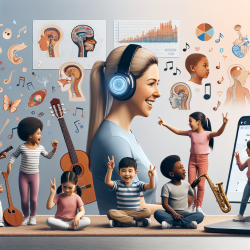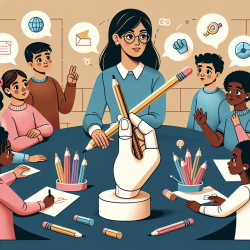As a practitioner focused on improving outcomes for children, understanding the role of music in the lives of children with hearing loss is crucial. The study "The Role of Music in Families of Children With Hearing Loss and Normal Hearing in Australia, Finland, and the UK" provides valuable insights into how music engagement can benefit children, regardless of their hearing status. This blog will summarize key findings from the study and suggest practical ways to incorporate these insights into your practice.
Key Findings from the Study
The study involved parents of children aged 2–6 years from Australia, Finland, and the UK. It compared the role, importance, and value placed on music by families with normally hearing (NH) children to those with a child with hearing loss (HL). The study found that:
- Children, regardless of hearing levels, started responding to music at similar ages.
- Overall music participation frequency and enjoyment were relatively similar between NH and HL groups.
- Music is seen as an important part of family life by parents of both NH and HL children.
- There were few significant differences between the participation levels of children in the three countries.
Practical Applications for Practitioners
Based on these findings, here are some practical ways to incorporate music into your therapy sessions:
1. Encourage Music Participation
Encourage parents to involve their children in music-related activities, regardless of their hearing status. Activities can include:
- Listening to music
- Singing
- Dancing
- Playing musical instruments
2. Use Visual Cues
For children with hearing loss, visual cues can enhance music enjoyment. Encourage parents to use visual aids such as watching music videos or live performances.
3. Create a Quiet Environment
A quiet listening environment can significantly improve music perception and enjoyment for children with hearing loss. Suggest that parents minimize background noise during music activities.
4. Integrate Music into Daily Routines
Music can be seamlessly integrated into daily routines, such as during playtime, bedtime, or car rides. This can help children develop a natural affinity for music.
5. Discuss Music with Parents
Discuss the importance of music with parents and provide resources or recommendations for music-related activities and programs. Highlight the benefits of music for speech perception, language development, and emotional regulation.
Encouraging Further Research
While this study provides valuable insights, further research is needed to explore the long-term benefits of music participation for children with hearing loss. Encourage parents and colleagues to stay informed about new research findings and consider participating in studies that contribute to this growing body of knowledge.
To read the original research paper, please follow this link: The Role of Music in Families of Children With Hearing Loss and Normal Hearing in Australia, Finland, and the UK.










